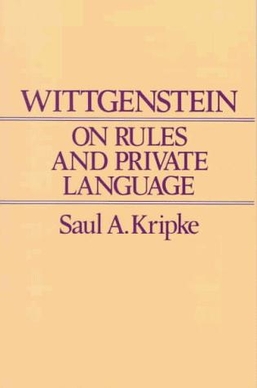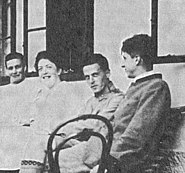
A definition is a statement of the meaning of a term. Definitions can be classified into two large categories: intensional definitions, and extensional definitions. Another important category of definitions is the class of ostensive definitions, which convey the meaning of a term by pointing out examples. A term may have many different senses and multiple meanings, and thus require multiple definitions.

Ludwig Josef Johann Wittgenstein was an Austrian philosopher who worked primarily in logic, the philosophy of mathematics, the philosophy of mind, and the philosophy of language.
Metaphilosophy, sometimes called the philosophy of philosophy, is "the investigation of the nature of philosophy". Its subject matter includes the aims of philosophy, the boundaries of philosophy, and its methods. Thus, while philosophy characteristically inquires into the nature of being, the reality of objects, the possibility of knowledge, the nature of truth, and so on, metaphilosophy is the self-reflective inquiry into the nature, aims, and methods of the activity that makes these kinds of inquiries, by asking what is philosophy itself, what sorts of questions it should ask, how it might pose and answer them, and what it can achieve in doing so. It is considered by some to be a subject prior and preparatory to philosophy, while others see it as inherently a part of philosophy, or automatically a part of philosophy while others adopt some combination of these views.

Philosophical Investigations is a work by the philosopher Ludwig Wittgenstein, published posthumously in 1953.

The Tractatus Logico-Philosophicus is the only book-length philosophical work by the Austrian philosopher Ludwig Wittgenstein that was published during his lifetime. The project had a broad goal: to identify the relationship between language and reality, and to define the limits of science. Wittgenstein wrote the notes for the Tractatus while he was a soldier during World War I and completed it during a military leave in the summer of 1918. It was originally published in German in 1921 as Logisch-Philosophische Abhandlung. In 1922 it was published together with an English translation and a Latin title, which was suggested by G. E. Moore as homage to Baruch Spinoza's Tractatus Theologico-Politicus (1670).
Analytic philosophy is a broad movement or tradition within philosophy focused on analysis, which has been dominant within Western philosophy and especially anglophone philosophy since the latter half of the 20th century. The proliferation of analysis in philosophy began around the turn of the 20th century in the contemporary era in Germany, Austria, the United Kingdom, the United States, Canada, Australia, New Zealand, and Scandinavia.
Nonsense is a communication, via speech, writing, or any other symbolic system, that lacks any coherent meaning. In ordinary usage, nonsense is sometimes synonymous with absurdity or the ridiculous. Many poets, novelists and songwriters have used nonsense in their works, often creating entire works using it for reasons ranging from pure comic amusement or satire, to illustrating a point about language or reasoning. In the philosophy of language and philosophy of science, nonsense is distinguished from sense or meaningfulness, and attempts have been made to come up with a coherent and consistent method of distinguishing sense from nonsense. It is also an important field of study in cryptography regarding separating a signal from noise.
Ordinary language philosophy (OLP) is a philosophical methodology that sees traditional philosophical problems as rooted in misunderstandings philosophers develop by distorting or forgetting how words are ordinarily used to convey meaning in non-philosophical contexts. "Such 'philosophical' uses of language, on this view, create the very philosophical problems they are employed to solve."

Wittgenstein on Rules and Private Language is a 1982 book by philosopher of language Saul Kripke in which he contends that the central argument of Ludwig Wittgenstein's Philosophical Investigations centers on a devastating rule-following paradox that undermines the possibility of our ever following rules in our use of language. Kripke writes that this paradox is "the most radical and original skeptical problem that philosophy has seen to date" (p. 60). He argues that Wittgenstein does not reject the argument that leads to the rule-following paradox, but accepts it and offers a "skeptical solution" to alleviate the paradox's destructive effects.
An ostensive definition conveys the meaning of a term by pointing out examples. This type of definition is often used where the term is difficult to define verbally, either because the words will not be understood or because of the nature of the term. It is usually accompanied with a gesture pointing to the object serving as an example, and for this reason is also often referred to as "definition by point ".
Neopragmatism, sometimes called post-Deweyan pragmatism, linguistic pragmatism, or analytic pragmatism, is the philosophical tradition that infers that the meaning of words is a result of how they are used, rather than the objects they represent.

The private language argument argues that a language understandable by only a single individual is incoherent, and was introduced by Ludwig Wittgenstein in his later work, especially in the Philosophical Investigations. The argument was central to philosophical discussion in the second half of the 20th century.

Family resemblance is a philosophical idea made popular by Ludwig Wittgenstein, with the best known exposition given in his posthumously published book Philosophical Investigations (1953). It argues that things which could be thought to be connected by one essential common feature may in fact be connected by a series of overlapping similarities, where no one feature is common to all of the things. Games, which Wittgenstein used as an example to explain the notion, have become the paradigmatic example of a group that is related by family resemblances. It has been suggested that Wittgenstein picked up the idea and the term from Friedrich Nietzsche, who had been using it, as did many nineteenth century philologists, when discussing language families.
In philosophy—more specifically, in its sub-fields semantics, semiotics, philosophy of language, metaphysics, and metasemantics—meaning "is a relationship between two sorts of things: signs and the kinds of things they intend, express, or signify".

Peter Michael Stephan Hacker is a British philosopher. His principal expertise is in the philosophy of mind, philosophy of language, and philosophical anthropology. He is known for his detailed exegesis and interpretation of the philosophy of Ludwig Wittgenstein, his critique of cognitive neuroscience, and for his comprehensive studies of human nature.
The problem of religious language considers whether it is possible to talk about God meaningfully if the traditional conceptions of God as being incorporeal, infinite, and timeless, are accepted. Because these traditional conceptions of God make it difficult to describe God, religious language has the potential to be meaningless. Theories of religious language either attempt to demonstrate that such language is meaningless, or attempt to show how religious language can still be meaningful.
In analytic philosophy, philosophy of language investigates the nature of language and the relations between language, language users, and the world. Investigations may include inquiry into the nature of meaning, intentionality, reference, the constitution of sentences, concepts, learning, and thought.
Gordon Park Baker was an American-English philosopher. His topics of interest included Ludwig Wittgenstein, Gottlob Frege, Friedrich Waismann, Bertrand Russell, the Vienna Circle, and René Descartes. He was noted for his collaboration with Peter Hacker and his disagreements with Michael Dummett.
The picture theory of language, also known as the picture theory of meaning, is a theory of linguistic reference and meaning articulated by Ludwig Wittgenstein in the Tractatus Logico-Philosophicus. Wittgenstein suggested that a meaningful proposition pictured a state of affairs or atomic fact. Wittgenstein compared the concept of logical pictures with spatial pictures. The picture theory of language is considered a correspondence theory of truth.
The Blue and Brown Books are two sets of notes taken during lectures conducted by Ludwig Wittgenstein from 1933 to 1935. They were mimeographed as two separate books, and a few copies were circulated in a restricted circle during Wittgenstein's lifetime. The lecture notes from 1933–1934 were bound in blue cloth, and the notes dictated in 1934–1935 were bound in brown. Rush Rhees published these together for the first time in 1958 as Preliminary Studies for the "Philosophical Investigations".







